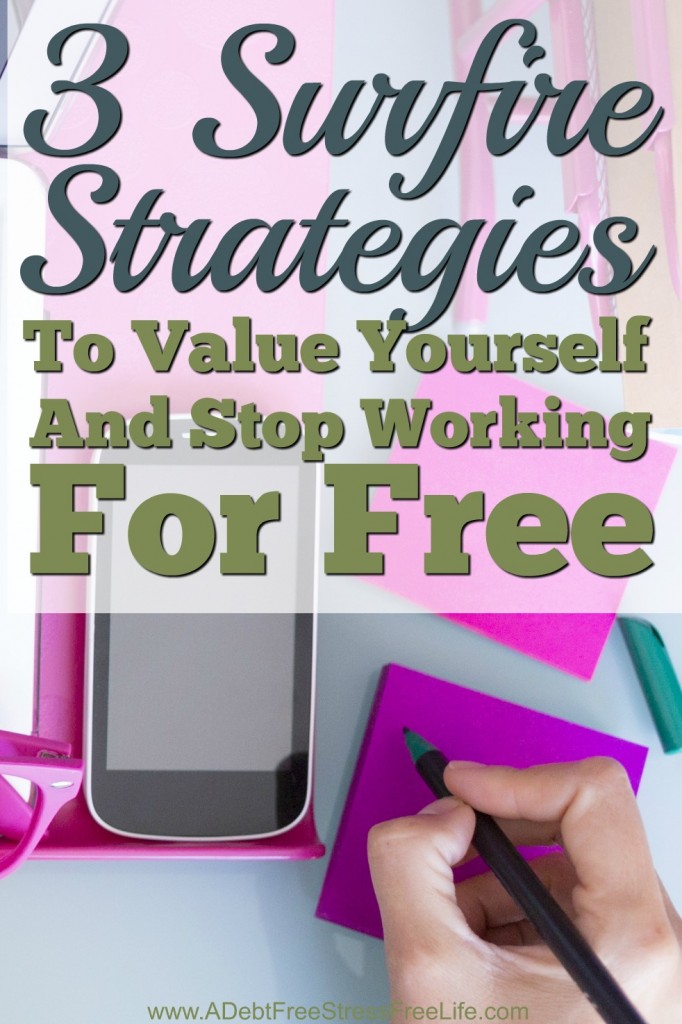A Mess Free Life may collect a share of sales or other compensation from the links on this page.
A few days ago I saw this post circulating Facebook. It was an open letter to Oprah Winfrey from a performer, Revolva. Revolva is a performer in San Fransisco. She was asked to perform at Oprah’s “The Life You Want Tour” back in 2014. The problem was, she was asked to devalue herself and work for free.
In the post, Revolva was making the point that “To achieve the life you want, avoid situations that devalue your worth. Like when Oprah’s “The Life You Want” tour, with its tickets priced up to $999, asks you to perform for free.”
Many people have been approached and asked to work for free, and unfortunately, a good number of them have complied. What holds you back from requiring people pay you for your work? Why do you feel the need to say yes when someone asks you to work for free?
Table of Contents
3 Surefire Strategies To Value Yourself and Stop Working For Free
I was once at a luncheon, and a group of smart and successful business women were discussing this issue of charging our worth and not working for free. People had varying reasons for not being comfortable with charging their worth, but it basically came down to one thing – FEAR.
- Fear of losing a potential client/sponsor by charging higher fees.
- Fear of losing an existing customer/sponsor by asking for more money.
- Fear of appearing greedy.
- Fear of making more money (I know some of you are saying, “who would be afraid to make more money?” but it’s a real fear for some).
- Fear of how it will look to family and friends if they are making boatloads of money.
- Fear they’re not worth it.
When you read this does it sound like you? Do you have fear around charging an appropriate amount of money for your time?
Read: 3 Reasons Bartering Is A Bad Idea
1. Get Out of The Dark
It’s time to turn on the lights! It’s time to start looking at this situation with crystal clear vision and a big spotlight.
If you’re going to make any changes to your money situation and start valuing yourself enough to stop working for free, you are going to have to be honest with yourself and start telling the truth. You’re going to have to stop denying and dodging your responsibilities.
Honesty and truth pave the way. Here’s why:
When you’re honest, you share your thoughts, feelings, emotions, judgments and even how it made you feel in your body. For example, if I say, “When I saw the amount the sponsor was willing to pay and that I had agreed to it, I was thinking, you fool, you did it again. I was literally sick to my stomach.” That’s an honest statement.
The truth would sound something like this, “I wrote an 800-word piece, it took me four hours to complete the project, and I was paid $50 for my time.”
No emotions, no judgments, just the plain and simple truth.
Read: 4 Traits of Underearners
Honesty is a very necessary step; it clears the way for the truth to be revealed. But honesty in and of itself isn’t enough to change your ways.
Our first reaction is to reveal the honesty — to spew out all the emotions, the feelings and thoughts, the rationalizations and justifications. They come pouring out when we are honest; it’s human nature. The situation is emotionally charged, and that’s why we behave this way.
But peel back the honesty and what’s left is the truth of our behavior. The truth is our responsibility in the mess we have created. And that, my friend, is much harder to disclose.
You need to get truthful. But a word of caution — do it with a big dose of compassion.
Read: Mindset Secrets of Successful Bloggers
2. Get Support
It’s tough to make long lasting and permanent change if you don’t have the right support.
Most of us wrongly think that just having a mentor will ensure success. But what I’ve come to realize is you need different kinds of support if you’re going to be permanently successful in changing your under-earning, devaluing situation.
Support can come from many places, but we need these four types of support to really make the difference.
- The Fan Club: These are the people in your life who believe in you and your abilities. They cheer you on, encourage you and celebrate your success.
- The Confidante: These are the people you bare your soul to. They’re the ones with whom you share your attitudes about money, struggles and efforts to change.
- The Role Model: We all need people who show us the way and let us know we can do it, too.
- The Messenger: These are the people who send you a lead, a message, give you information or ideas that propel you forward. They are the ones who help you along the way.
Unfortunately, under-earners and victims tend to operate in isolation or hang out with other victims and naysayers. So, it’s safe to say the people you associate with on a regular basis significantly impact your ability to succeed.
Make sure you’re getting the right kind of support and stay away from people who will bring you down.
Read: How To Adopt A Millionaire Mindset
3. Respect the Dollar
I once saw this great quote by Roger Babson. It said, “More people should learn to tell their dollars where to go instead of asking them where they went.”
The problem with most people is that they don’t have respect for money. If you want to break free of the under-earning cycle or want to finally rid yourself of the undervaluing mentality with money, then you need to learn to respect money.
You demonstrate respect for money by paying attention to it and treating it like you would any other relationship or item you value. When you don’t pay attention to money, it always gets your attention in ways that are typically not good — like late payment notices, your lights being shut off, overdraft or foreclosure notices just to name a few.
Learning to respect money, to make thoughtful and deliberate choices about what you do with your money is often overlooked but is the most important step.
Read: Money and Values {What’s One Got To Do With The Other}
Next time someone asks you to work for free or offers you some horribly cheap price for your hard work, take a step back and remember how valuable you truly are. Assess the situation and ask yourself if this fee, for all your time and effort, is really worth it.
If you do this honestly, you’ll probably take a well-deserved pass and have taken another step closer to valuing yourself.




